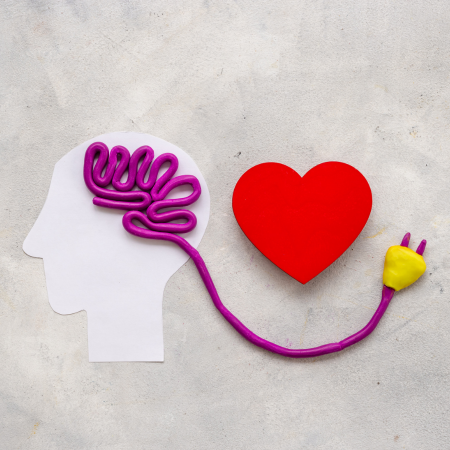“I think, therefore I am!” Ever since the renowned philosopher René Descartes introduced this concept, the paradigm of the world has shifted. Our thoughts are more than just the little voice in our heads that we hear when we read or think to ourselves. Some go as far as to suggest that one can simply put our mind over matter, or that our problems are all just in our heads. While this may sound invalidating to our subjective experiences, there is a sense of truth in it, as entire modalities in psychotherapy have anchored their effectiveness in addressing our thoughts.
Issues brought upon by our thoughts in daily living include how irrational thoughts, automatic negative thoughts, cognitive distortions, and the like can lead to ineffective behaviors that hinder us from truly living. Fast forward to today, I would playfully argue with Mr. Descartes that, thanks to him, we now live in a world where overthinking is rampant, we spend a lot of time in our heads, and how we often try to headbutt our way through life.
From philosophers to psychologists, let us take a look at modern perspectives about thoughts.
Cognitive Triangle

Fundamental to Cognitive Behavior Therapy (CBT) is the concept of the cognitive triangle. The cognitive triangle shows that our thoughts, feelings, and behaviors are all interconnected. Changing one of these parts can affect the others. Understanding this triangle can help us recognize patterns in our thinking, manage our emotions more effectively, and make positive changes in our behavior. While we may have limited control over what happens to us, we have more power to determine our lives when we focus on our patterns of thinking (Beal, 2023).
PROBLEMS IN THINKING
Delving deeper into this thought, we discover various patterns in thinking that have the potential to restrict us from fully experiencing life. These patterns, often observed and addressed by psychotherapists trained in Cognitive Behavioral Therapy (CBT), encompass a range of cognitive distortions, such as catastrophizing, black-and-white thinking, and overgeneralization to name a few. These distortions skew our perception of reality, which could lead to behaviors and emotions that are not based on reality.
Additionally, overthinking or rumination, characterized by repetitive thoughts, can consume our mental energy and hinder our ability to focus on the present moment. The Latin origin of the word “rumination” is “ruminatio,” derived from the Latin verb “ruminare,” which means “to chew over again” or “to ponder.” Similarly, irrational thoughts, fueled by unfounded fears or beliefs, can perpetuate negative self-talk and limit our confidence and potential for growth.
HOW TO PRACTICE SKILLFUL THINKING
Dialectical Thinking
Life offers many paradoxes, and finding the middle path is the main idea when it comes to Dialectical Thinking. This mindset of seeking balance in opposing truths is central to the practice of Dialectical Behavioral Therapy (DBT) and can be observed when we attempt to reconcile two seemingly contradictory beliefs. One particular dialectic that has personally helped me become more compassionate toward myself and others is the idea that we are all striving to do our best while simultaneously having room for improvement. One can imagine that the pressure of wanting to be the best can leave people feeling burnt out. Dialectical thinking reminds me that it’s acceptable to have expectations and standards for ourselves while also granting ourselves the compassion we deserve.
When it comes to our emotions, adopting the mindset of thinking “both-and” rather than “either-or” can help create more space to allow us to experience all of our feelings. Recognizing that we can feel both happy and sad, both love and hate someone, enables us to acknowledge and process emotions that we may initially resist. It’s normal to experience mixed emotions, and sometimes even seemingly contradictory emotions about the same thing. Through dialectical thinking, we can embrace the nuances and paradoxes of life, allowing for a richer and more authentic emotional experience.
We are not our thoughts – Cognitive Defusion
When it comes to our thoughts, have you ever considered who is the thinker? We now know that thoughts are very powerful and faulty at the same time, it would be helpful to build a relationship with our thoughts that allows for more freedom and choice. One of the ways we can do that is through the practice of Cognitive Defusion
We can do this by simply rephrasing our inner chatter and adding the statement of “I am noticing” to whatever thought or emotion you might be thinking or feeling. For example, when you catch yourself thinking about the uncertainties of the future, you might normally think to yourself, “I am worried about the future”. To create more space, you can change the thought to “I am noticing that I am thinking about the future.”
When we develop the ability to watch our thoughts and adopt the mindset of being the thinker of our thoughts, we can create space for us to choose how to proceed mindfully. It does not make the future any more or less certain, but at least we can give ourselves more freedom to choose how to proceed. Try it out and see how this feels for you!
Wise Mind
Another concept that can help us be more skillful in thinking is the concept of the wise mind. We may have heard about how we can be left-brain dominant (analytical) or right-brain dominant (creative). DBT introduces the concept of a balanced approach that integrates both types of brain function. This balanced state, known as the wise mind, encompasses the rational and analytical qualities of the left brain as well as the intuitive and creative aspects of the right brain.
In the wise mind, individuals can draw upon both analytical reasoning and intuitive insights to navigate various situations and make informed decisions. It involves tapping into a deeper level of understanding that transcends mere logic or emotion, allowing for a more holistic and integrated approach to problem-solving and life in general.
As we delve into the intricate web of our thoughts, emotions, and behaviors, we have learned from Mr. Descartes that thinking is the way to go! While our thoughts hold sway over our perception of reality, as seen in the Cognitive Triangle, it becomes evident that there are limitations to our thoughts. From cognitive distortions to overthinking, it’s important for us to identify the shortcomings of our thoughts. While certain thoughts and feelings might initially seem contradictory or opposite, learning to rest in the reconciliation of such ideas can help create more space in our minds and hearts. It can be quite easy for us to overidentify with our thoughts, which is why it’s important to remember that we are not our thoughts and that we have power over these thoughts. Lastly, it is equally crucial to honor and acknowledge the wisdom of our emotions. Striking a harmonious balance between rational thought and heartfelt intuition is key to living in the wise mind. So again, to Mr. Descartes,
“I think and feel, therefore I am.”
– Anonymous
References:
- Beal, D. G. (2023). Cognitive behavior therapy (CBT). Salem Press Encyclopedia of Health.
- Casabianca, S. S. (2022). Cognitive distortions: Negative thinking. PsychCentral. Retrieved from
https://psychcentral.com/lib/cognitive-distortions-negative-thinking#list-and-examples - Codington-Lacerte, C. (2023). Acceptance and commitment therapy (ACT). Salem Press Encyclopedia.
- Linehan, M. M. (2015). DBT® skill training handouts and worksheets. Guilford Press.
- Moglia, P. (2023). Dialectical behavioral therapy (DBT). Salem Press Encyclopedia of Health.

